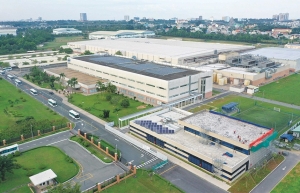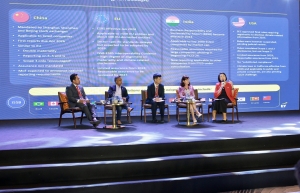Nestlé spreads green mindset in Vietnam
At a talk show on Vietnam's dual transformation held on August 12 in Hanoi by VIR, Le Hoai Thuong, Nestlé's senior corporate affairs manager, expressed confidence that once green thinking is firmly established, businesses will succeed in dual transformation and reap greater benefits in both business outcomes and environmental impact reduction.
 |
| Le Hoai Thuong, senior corporate affairs manager, Nestlé' |
Drawing from her own experience, Thuong highlighted the crucial role of those directly involved in the transformation process.
"Farmers are at the heart of this change. Given the high demands from international partners regarding product traceability, particularly in proving and declaring emissions sources, it is the farmers who must green their thinking. This involves paying more attention to their environment and applying digital transformation in farming to calculate the emissions levels of coffee during production," said Thuong.
Nestlé, focusing on a farmer-centric approach, prioritises collaboration with state agencies and scientists to develop sustainable agricultural practices for Vietnamese coffee. It then conducts scientific reviews to identify areas for improvement in coffee cultivation, such as water shortages, drought, and pest control, and supports farmers in replanting and developing pest-resistant coffee varieties.
With this direction, during the second progress report on the NESCAFÉ Plan in mid-May, a project in collaboration with the Ministry of Agriculture and Rural Development and other partners to promote sustainable coffee development, Nestlé noted a 40 per cent reduction in irrigation water usage and a 20 per cent reduction in fertiliser use.
Thuong also emphasised Nestlé's focus on mechanical and electrical systems, signalling the benefits of digital transformation.
"We help farmers recognise the benefits of digital transformation for themselves. By following standardised farming practices, they can increase the value of their output. In Vietnam and other major coffee markets, Nestlé connects farming communities through the Agrinest platform to share practical knowledge. Vietnam is one of the fastest adopters of this platform," she said.
Nestlé exports products to more than 20 markets worldwide, including demanding regions like Europe. The company's digital and green transformation efforts, initiated more than a decade ago, have allowed Nestlé to anticipate and comply with stringent regulations from these markets, while also maintaining and enhancing its global competitiveness.
"Nestlé is targeting the domestic market and positioning Vietnam as a global production hub, thanks to their new profile as global food producers, Vietnamese farmers are ready to proactively bring Vietnamese coffee to the world," added Thuong.
Vietnam must comply with new extended producer responsibility requirements to export coffee to Europe by December. Given the industry's familiarity with technology and green production, Vietnamese coffee is poised for further success through exports.
Nestlé estimates that coffee-growing households can increase their income by at least 30 per cent, and even up to 100 per cent.
Since 2011, the NESCAFÉ Plan has been implemented in the Central Highlands provinces. To date, the scheme has conducted over 355,000 training sessions on sustainable coffee farming for farmers, supported an average of more than 15,000 farming households annually between 2011 and 2023, distributed over 74 million high-yield coffee plant seedlings, and facilitated replanting of more than 74,000 hectares of ageing coffee crops.
 | High-tech mindset favoured for advances in processing Processing and manufacturing continues to lead the way in foreign investment mobilisation - however, moving towards a high-tech industry is essential for long-term and sustainable development. |
 | Brand new mindset required for proper usage of electricity Electricity in Vietnam is being used at inferior efficiency compared to other countries, which is providing a challenge to find solutions on effectively using and saving it. |
 | Balancing digitalisation and greening the economy Digitalisation, if not carefully managed, could cause significant damage to sustainable development, so the deployment of new technology must go hand in hand with sustainable development principles. |
What the stars mean:
★ Poor ★ ★ Promising ★★★ Good ★★★★ Very good ★★★★★ Exceptional
Related Contents
Latest News
More News
- Trung Nam-Sideros River consortium wins bid for LNG venture (January 30, 2026 | 11:16)
- Vietnam moves towards market-based fuel management with E10 rollout (January 30, 2026 | 11:10)
- Envision Energy, REE Group partner on 128MW wind projects (January 30, 2026 | 10:58)
- Vingroup consults on carbon credits for electric vehicle charging network (January 28, 2026 | 11:04)
- Bac Ai Pumped Storage Hydropower Plant to enter peak construction phase (January 27, 2026 | 08:00)
- ASEAN could scale up sustainable aviation fuel by 2050 (January 24, 2026 | 10:19)
- 64,000 hectares of sea allocated for offshore wind surveys (January 22, 2026 | 20:23)
- EVN secures financing for Quang Trach II LNG power plant (January 17, 2026 | 15:55)
- PC1 teams up with DENZAI on regional wind projects (January 16, 2026 | 21:18)
- Innovation and ESG practices drive green transition in the digital era (January 16, 2026 | 16:51)

 Tag:
Tag:




















 Mobile Version
Mobile Version